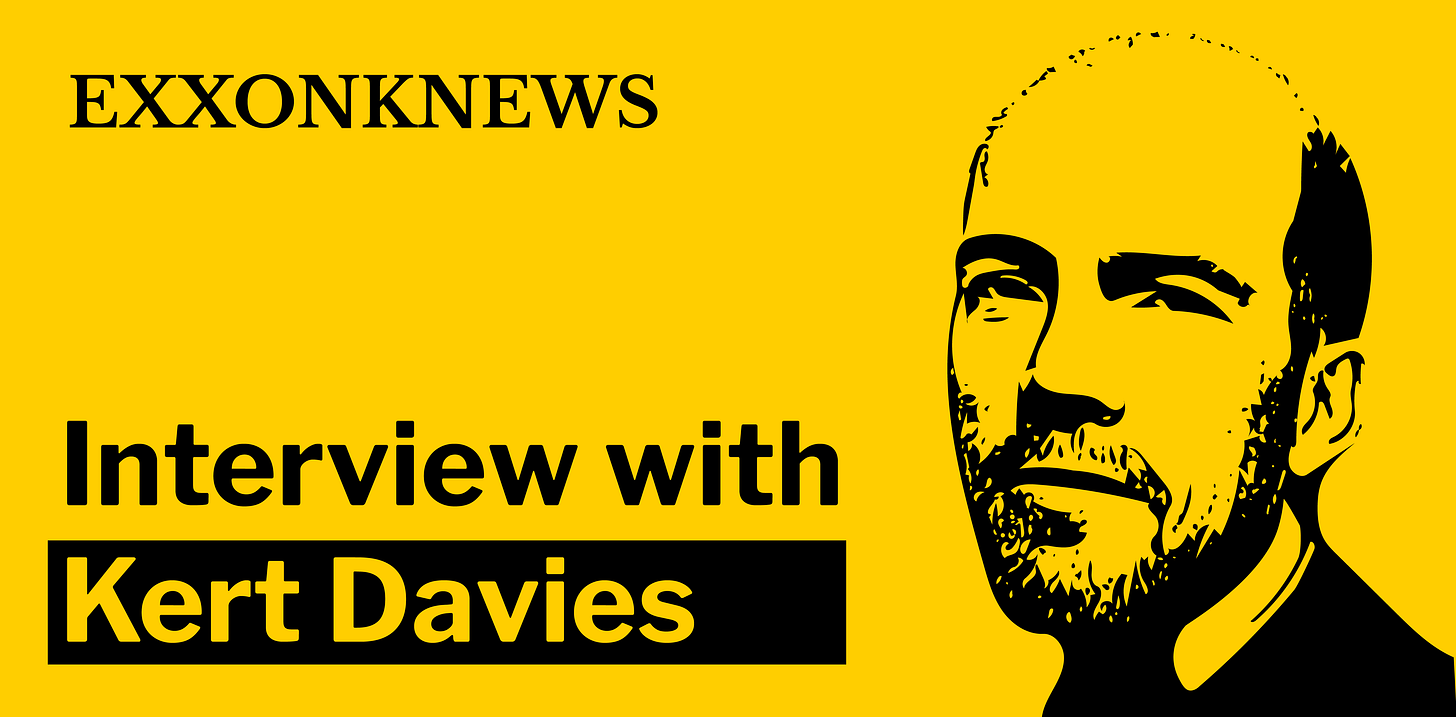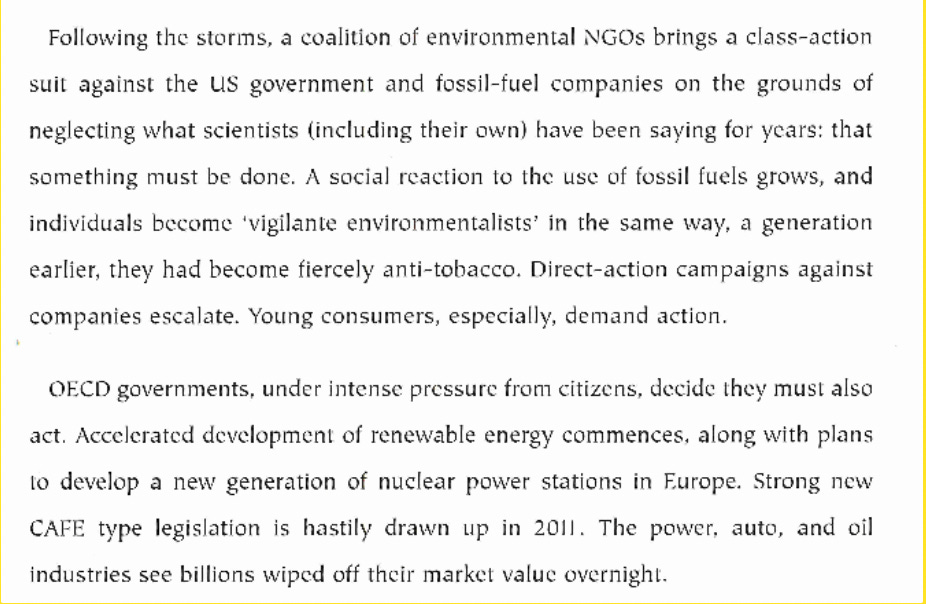A Big Oil watchdog talks Russia, fossil fuel interests, and the movement for accountability
Kert Davies, one of the movement’s top archival researchers, shares his insights with EXXONKNEWS.
Emily Sanders is the Center for Climate Integrity’s editorial lead. Catch up with her on Twitter here.
Good morning. Executives of six major oil and gas corporations — ExxonMobil, BP America, Shell, Chevron, Devon Energy, and Pioneer Natural Resources — have agreed to testify before the U.S. House Energy and Commerce Committee on Wednesday, April 6, about their role in rising gas prices.
Meanwhile, new analysis from Oil Change International, Global Witness, and Greenpeace shows that Exxon, Shell and BP, and other oil giants have funneled billions to the Russian government since 2014.
To put this all in historical perspective, Hiroko Tabuchi at The New York Times last week published a deep dive on the oil and gas industry’s decades-long lobbying for Russian state oil interests, including a Soviet-era pipeline that helped solidify Europe’s reliance on Russian gas, even against warnings from the CIA:
I asked Kert Davies, oil industry watchdog extraordinaire and founder and director of the Climate Investigations Center, to help fill in this picture. Davies has been investigating Big Oil’s deception for more than two decades. His dedicated archival research helped surface many of the documents revealing Exxon’s early knowledge of the climate crisis and subsequent disinformation campaigns to stall climate action. The Climate Investigations Center has published its own research into Big Oil’s business with the Kremlin, and pieces of that research are cited in the recent Times story.
Our interview, edited for length and clarity, is below.
EK: Hiroko Tabuchi’s story about the history of Big Oil’s business in Russia is yet another example of the fossil fuel industry putting its profits and interests above all else, in the words of the Times, “over national security, human rights or environmental concerns.” What were some of your biggest takeaways from that story and the current politics of oil, gas, and Russia right now?
KD: Well, in journalist Steve Colls’ book, “Private Empire: ExxonMobil and American Power,” an executive recalls saying to former Exxon CEO Lee Raymond at an industry meeting, something along the lines of, “Hey, can you build some more refineries? Because there's a fuel shortage, and the United States needs it for security.” And Raymond's response was, “I’m not a U.S. company and I don’t make decisions based on what’s good for the U.S.” Like basically we don't care, you know?
He's just being blunt, but he's being honest that [Exxon’s] interests do not align with the United States’ national security interests, or domestic security interests, or domestic economic interests.
At the end of the Times piece, Hiroko [Tabuchi] references a [Rosneft promotional] video about the Rosneft-Exxon deal that I luckily copied eight years ago. And in that deal, if you listen to it, it's got this dramatic voice with a British accent, and the soundtrack is like Star Wars or something — it's absurd, but the guy is saying they call it a “strategic partnership” with Exxon to build out this stuff and gain knowledge of fracking, working experience in the United States in Texas and Alaska and the Gulf of Mexico. It's totally from the Kremlin's point of view, Rosneft being owned by the Kremlin. And here we are, a decade later.
That’s part of the reason, besides nuclear weapons, that nobody is reacting as strongly against this aggression, because they're all dependent on that gas to keep their houses warm. They have this leverage — they can literally turn off the heat. The article really brought back to the fore that these worries have existed for a couple of generations here of leadership, and we did nothing to stop it, solidifying fossil fuel addiction and the control that the industry has over political decisions.
One thing that I think would be important is a congressional investigation of the role of the oil majors in Russia overall, and the history. There's a lot that we don't know and from what we do know, these companies have been extremely helpful to the Kremlin, at least for the past few decades. And the public deserves to know the full extent of those relationships.
EK: Of course, today you see the American Petroleum Institute and other industry voices claiming that fossil fuels are essential for American freedom and energy independence.
KD: It’s an easy fib for them to tell now, as if we're going to solve all of this by just drilling and exporting more. It's what they wanted all along – but they’re lying about that too, because they’re saying, well if Biden hadn't canceled the Keystone pipeline then we wouldn't have this problem. Well, that's not true. There's no way. And there's also no way to export enough gas to equal the amount of gas coming in through these Russian pipelines that are talked about, and that go back, you know, 50 years. So, it's a convenient line for them, but they can't possibly do it [in time].
EK: How would you grade the way that the Biden administration and Democrats in Congress have responded to a lot of the industry’s propaganda over the last month?
KD: I think they are generally bending to the industry point of view. It's almost industry talking points — like we need to grow more, produce more, export more, absent any discussion of climate change impacts and nothing to phase out fossil fuels. It doesn't solve any of the underlying problems.
EK: You’ve spent decades researching the oil industry’s deception on various issues, and these issues are getting lots of overdue attention. Executives from top oil majors were brought into Congress to testify for the first time about their efforts to spread climate disinformation and obstruct climate action, and that investigation is ongoing. Now the chairs of two House committees asked oil majors to testify about rising gas prices and potential price gouging, and although executives turned one of the committees down, we’re going to have a hearing next week. How has the public and political narrative around accountability for the oil industry changed since you started doing this work?
KD: It's increased exponentially. I think that the public finally gets that there are culprits in the climate crisis, beyond their own carbon footprint, as BP tried to get us to all believe 10 years ago, trying to make it our fault. As the impacts are becoming more and more visible, and more and more local. Everybody sees that something's going terribly wrong with the climate. And there's a very clear culprit here. We know at least a big part of the story — that there are major industry forces that withheld the truth, that they themselves knew about the problem. They don't tell shareholders, they don't tell governments — they don't express that risk publicly. One document that illustrates this best is a Shell 1998 document. Shell is doing its own planning scenario. They predicted Hurricane Sandy. They predicted being blamed, and they predicted being held to account — and that's all coming true.
It's a little late, but it's never too late. I think that the public benefit of all this is that people will know the root cause of the delay [in addressing climate change].
EK: How are you seeing the industry react to the possibility that they're actually in for a reckoning right now?
KD: Very defensively. We've seen them claiming there's a conspiracy against them and all these very weak legal arguments that are not holding up in court. They will continue to fight against telling the truth and against coming clean until forever, I think. But I think we're also going to see a division in the ranks. We're going to see them making different stories about themselves or telling different histories.
There's a much different history within a company like Exxon than there is within a company like BP. They were fighting each other in the 90s because BP was taking a different approach and acknowledging the science. We have a tape of the head of Mobil in 1998, and he's facing internal pressure inside the company about climate change. And he says, you know, I've heard there are complaints from our employees about this, but we're not going to take the BP approach. It was really bad for the Exxons of the world in 1997, 98, to have BP and Shell going in a different direction.
Of course now we know that BP and Shell also knew the dire consequences of the climate crisis at least a decade earlier, by way of their own internal research and collective corporate research. But I think these internal fights are going to happen even more as these companies try to figure out how to present a unified front and get through this. As you heard during the hearing in the fall, they all say somewhat different things, and [Representative] Ro Khanna kind of called that out. They all have different net zeroes, different PR lines, different advertising lines. That's where it gets spicy for me.
EK: What could climate allies be doing better?
KD: You have a couple of dozen cities and states going after these companies for being deceptive about the impact of the products — a history that most people don't know. That empowers the movement on all levels. From keeping it in the ground to local environmental and climate justice impact zones to national policy, the oil industry should be held to account for this history, and therefore kept out of the room when you're negotiating their regulations. They should not be allowed to intervene the way they do.
For example, in Delaware, you have incredibly hot environmental justice fights to do with local impacts of the oil industry. And you have a state lawsuit against these companies for lying about their impact on the climate, for deceiving people about the impact of their products. So they’re kind of the same thing in a big diagram — we're all trying to hold the fossil fuel industry accountable.
ICYMI News Roundup





